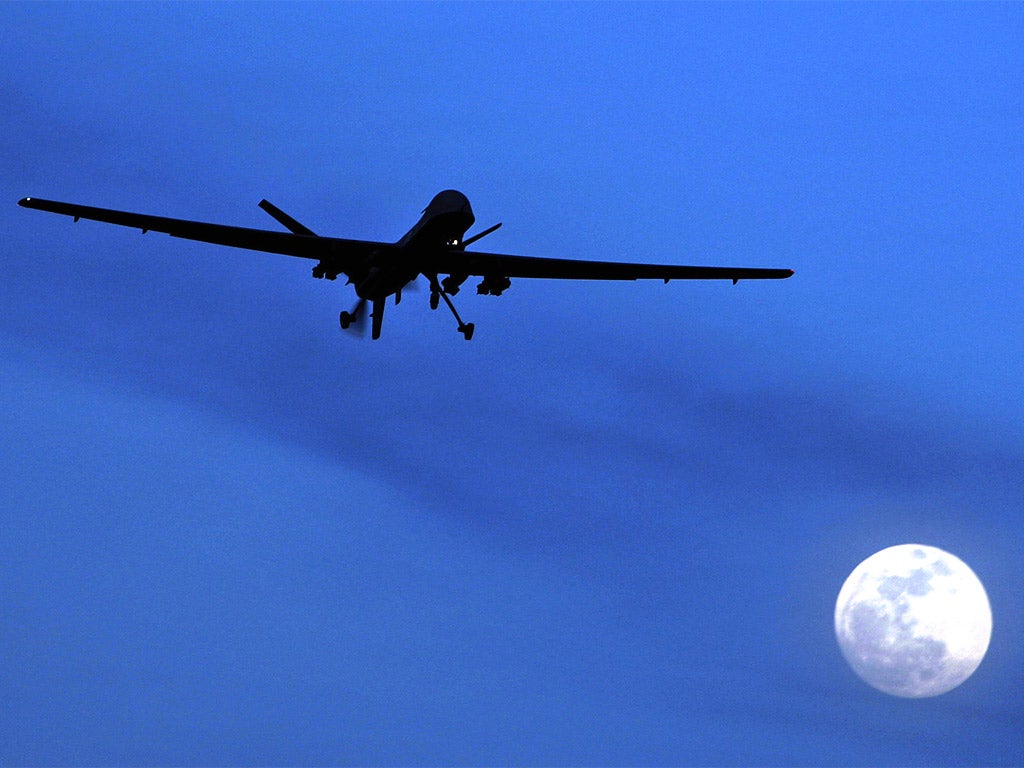UK use of drones in Afghanistan remains under wraps after disclosure campaign is thwarted
Campaigners vow to continue to fight 'culture of secrecy' after MoD backed over refusal to reveal information

Your support helps us to tell the story
From reproductive rights to climate change to Big Tech, The Independent is on the ground when the story is developing. Whether it's investigating the financials of Elon Musk's pro-Trump PAC or producing our latest documentary, 'The A Word', which shines a light on the American women fighting for reproductive rights, we know how important it is to parse out the facts from the messaging.
At such a critical moment in US history, we need reporters on the ground. Your donation allows us to keep sending journalists to speak to both sides of the story.
The Independent is trusted by Americans across the entire political spectrum. And unlike many other quality news outlets, we choose not to lock Americans out of our reporting and analysis with paywalls. We believe quality journalism should be available to everyone, paid for by those who can afford it.
Your support makes all the difference.Campaigners have vowed to continue to fight the "culture of secrecy" surrounding Britain's use of drones after a protracted legal battle to force the Government to disclose details of deployments in Afghanistan failed, with the information tribunal backing the Ministry of Defence's refusal to reveal information on military operations.
The appeal to the Information Commissioner was filed in wake of numerous Freedom of Information requests that were refused by the MoD. But after a two-day closed hearing the information tribunal supported the MoD's position with soldier's lives being cited as the key reason for the lack of disclosure.
"The MOD referred to the disclosure of the requested information as involving 'risk to life and limb', the Commissioner used the phrase 'life and death'," the ruling stated.
"We do not consider either of these phrases to be over-dramatising the level of risk that could be caused to service men and women should the information be released and available to enemy forces in Afghanistan."
Campaigners tonight branded the ruling "disappointing" but vowed to fight on, calling for Britain's involvement to be "brought out of the shadows". Dan Carey of Deighton Pierce Glynn, the law firm representing drone campaigner Chris Cole who originally filed the appeal, said: "The tribunal have decided that when the MoD waves the flag of troop safety this creates a virtually insurmountable barrier to disclosure, yet, in not disclosing to us even the explanation given by the MoD, it has been impossible for us to respond meaningfully."
Cori Crider, strategy director of Reprieve, said: "We know that the UK is closely involved in supporting the CIA in carrying out these illegal strikes, yet they are still refusing to come clean. Today's ruling is disappointing, but the fact remains that the US-UK drone wars must be brought out of the shadows."
The refusal to divulge information on Britain's use of drones in combat comes after just a week after a United Nations report called on the CIA to declassify information and clarify its position on the legality of drone strikes.
Britain has been under mounting pressure to clarify its position on drones which has intensified in recent months. In April, it emerged that crew at RAF Waddington in Lincolnshire had assumed control of armed Reaper drones flying over Afghanistan. Previously, all UAV missions over Afghanistan had been operated from Creech air force base in Nevada.
The MoD previously insists that it does not use armed UAVs against terrorist suspects outside Afghanistan, and that the vast majority of UK drone flights are reconnaissance missions. But British drones within Afghanistan are thought to have deployed 350 weapons since 2007, including Hellfire guided missiles and laser-guided bombs.
Last week a report by the UN's special rapporteur on human rights and counter-terrorism, Ben Emmerson QC, called on the US to declassify information about operations co-ordinated by the CIA.
It also shed new light on the technical aspects of British drones. Reaper UAVs, used by the RAF, have a range of 3,700 miles (5,900 km), a maximum airspeed of 250 knots and can ascend to 15,300 metres (50,000 feet), the document explained.
Their missions can last up to 18 hours. The Reaper carries three cameras as well as laser-guided bombs. Three communication networks relay information between the RAF ground station in the UK and the UAV: "a secure internet-based chat function, a secure radio routed via satellite and a secure telephone system".
Mr Emmerson's report stated: "The United Kingdom has reported only one civilian casualty incident, in which four civilians were killed and two civilians injured in a remotely piloted aircraft strike by the Royal Air Force in Afghanistan on 25 March 2011,". An RAF inquiry found that "the actions of the [ground] crew had been in accordance with the applicable rules of engagement".
In a statement, an MoD spokesman said: "We take our responsibilities under the FOI Act very seriously and fully recognise the general public interest in openness.
"However, the FOI Act does allow for information to be withheld in certain situations when harm could result from its release. We agree with the findings of the Tribunal that due to the risk to the effectiveness, capability and security of our forces this is such a case."
Subscribe to Independent Premium to bookmark this article
Want to bookmark your favourite articles and stories to read or reference later? Start your Independent Premium subscription today.
Join our commenting forum
Join thought-provoking conversations, follow other Independent readers and see their replies
Comments